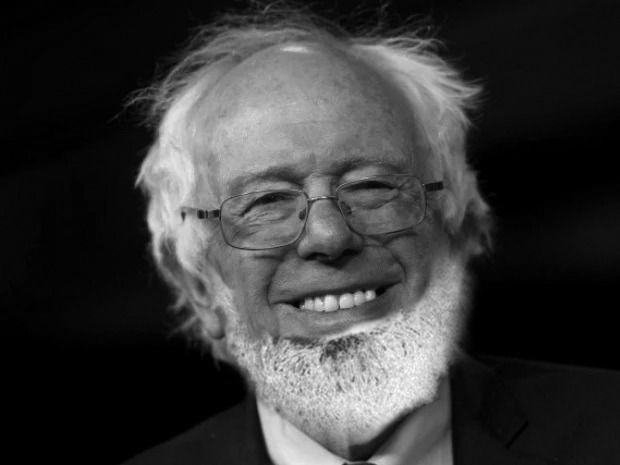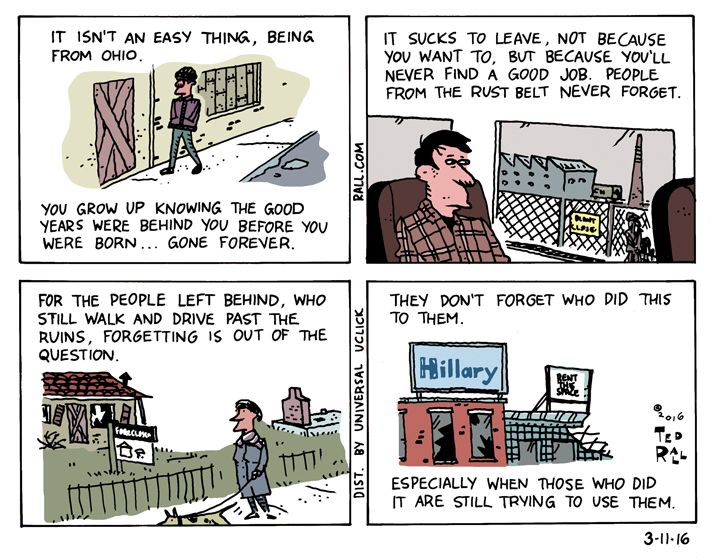Octafish
Octafish's JournalWhy I Oppose Imperialism -- or -- Rome Wasn't Built in an Election
Empires are un-democratic. Not all its members are equal. Those with power and wealth are afforded more rights and privileges.
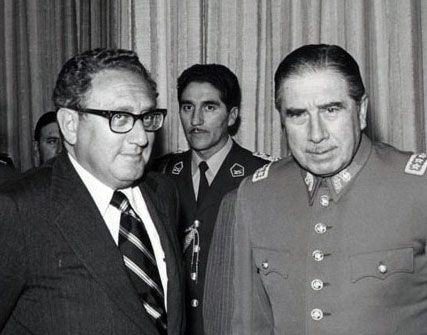
And, as Milton Friedman saw, the wealth of empire flows up to those at the top, the aristocracy and their satraps.
The Dark Age of Money
by JAMES C. KENNEDY
CounterPunch Oct. 24, 2012
EXCERPT...
Monetary Fascism was created and propagated through the Chicago School of Economics. Milton Friedman’s collective works constitute the foundation of Monetary Fascism. Knowing that the term ’Fascism’ was universally unpopular; Friedman and the Chicago School of Economics masquerade these works as ‘Capitalism’ and ’Free Market’ economics.
SNIP...
The fundamental difference between Adam Smith’s free market capitalism and Friedman’s ‘free market capitalism’ is that Friedman’s is a hyper extractive model, the kind that creates and maintains Third-World-Countries and Banana-Republics, without geo-political borders.
If you say that this is nothing new, you miss the point. Friedman does not differentiate between some third world country and his own. The ultimate difference is that Friedman has created a model that sanctions and promotes the exploitation of his own country, in fact every country, for the benefit of the investor, money the uber-wealthy. He dressed up this noxious ideology as ‘free market capitalism’ and then convinced most of the world to embrace it as their economic salvation.
SNIP...
Monetary Fascism, as conceived by Friedman, uses the powers of the state to put the interest of money and the financial class above and beyond all other forms of industry (and other stake holders) and the state itself.
SNIP...
Money has become the state and the traditional state is forced to serve money’s interests. Everywhere the Financial Class is openly lording over sovereign nations. Ireland, Greece and Spain are subject to ultimatums and remember Hank Paulson’s $700 billion extortion from the U.S. Congress. The $700 billion was just the wedge. Thanks to unlimited access to the Discount Window, Quantitative Easing and other taxpayer funded debt-swap bailouts the total transfers to the financial industry exceeded $16 trillion as of July 2010 according to a Federal Reserve Audit. All of this was dumped on the taxpayer and it is still growing.
CONTINUED...
http://www.counterpunch.org/2012/10/24/the-dark-age-of-money/
Henry Kissinger doesn't think ALL people deserve democracy.
Which is sad kind of a person for DEMOCRATS to pal around with.
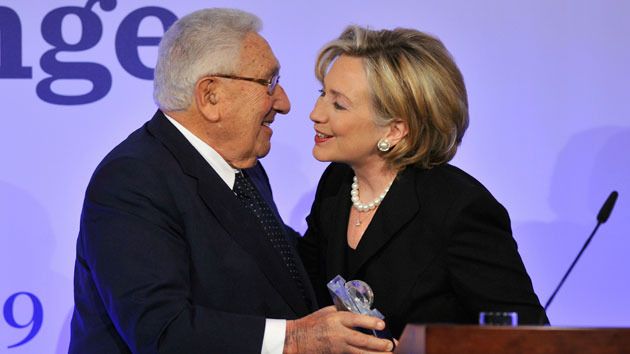
Anyway...Nixon, Kissinger and Co. were using Chile for a test bed for fascist economics:
A Critique of the Chicago School of Economics:
CHILE: THE LABORATORY TEST
EXCERPT...
Chile's privatized pensions
One of the most trumpeted "successes" of Chile's economic miracle is the privatization of its public social security system. It's most vocal supporter is Chilean economist José Piñera, who was once Pinochet's Minister of Labor, and therefore one of the most hated men in Chile. Today he is an international salesman of sorts, selling other nations on the idea of Chile's retirement program. Journalist Fred Solowey writes:
"In his speeches and articles, Piñera credits the Chilean pension model with producing just about everything short of the second coming of Christ: pensions that are 40-50 percent higher than under Social Security; security for the old; lower costs due to the 'fact' that the private sector is much more efficient than the public; a rate of savings rivaling that in an Asian 'tiger' economy; and even the end of class conflict in Chile." (38)
Piñera is co-chairman of a $2 million war being waged against U.S. Social Security by the Cato Institute. Their goal is to privatize the program along Chilean lines. Converts to their cause include Newt Gingerich, and, apparently, Time magazine. In a cover story entitled "The Case for Killing Social Security," Time included a sidebar on "How Chile Got it Right." (39) The operative word here is right, as in right-wing — Time's article quotes all the usual conservative think tanks, but not a single dissenting voice.
The Chilean retirement system is only a success to those companies who are pulling down outrageous profits from it. For the working people of Chile, it is a disaster in the making. According to SAFP, the government agency which regulates the private pensions, 96 percent of the known work force were enrolled in the private pensions as of February, 1995, but 43.4 percent of the account owners were not adding to their funds. Perhaps as many as 60 percent do not contribute regularly. Given the rising poverty in Chile, it is not difficult to understand why. Unfortunately, regular contributions are necessary to receive full benefits.
By 1988, about one fourth of Chilean workers were contributing enough to make the program's minimum benefits: $1.25 a day! (40) Critics charge that only 20 percent of the contributors will actually receive good pensions.
Worse, much of the plan's supposedly higher benefits are projected from the surging economic growth rates of the late 80s. But this growth followed a deep economic depression in 1983, and was bound to be high for many years following. Now that actual growth has caught up to potential growth, the Chilean economy is slowing down. The pensions are therefore not going to be as profitable as their cheerleaders claim.
When the current system was created in the early 80s, the government gave the people their choice: stay in the public program, or start contributing to private pensions. Over 90 percent of the people switched over to the private plan. This was carried out, however, under a mixture of threats, coercion and short term incentives. Many employers simply switched their employees' plans for them. The cash-starved public also received short-term pay increases by switching to private pensions, whereas the cost of the public programs went up for those who stayed in them.
"With the information I now have," says Cecilia Prado, a 17-year public employee, "I never would have switched. Under a democratic government they never could have imposed it on us. And if they ever passed a law allowing people to go back, there would be a great exodus." (41)
What many defenders of Chile's current program do not reveal is that under the old public plan, workers received not only pensions, but health care, low-interest housing loans from pension funds, and many other benefits. And that program covered 75 percent of all Chileans. When the private pensions went into effect, all these other services were dropped. As a result, Chile's "welfare pensions" for the desperately needy quickly rose 400 percent — up to the legal limit.
It is also extremely telling that when Pinochet introduced the program, his army and police were allowed to keep their own generous public plans. The private plans that were suitable for the masses apparently weren't good enough for those in charge of the country.
CONTINUED...
http://www.huppi.com/kangaroo/L-chichile.htm
José Piñera may still be working out of the Cato Institute, where the Koch Brothers are big.
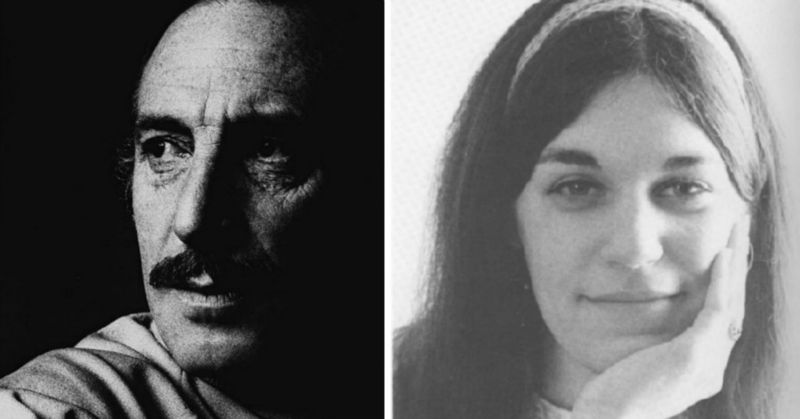
The following author would never get a chance to tell his side of the story in public, thanks to Operation CONDOR and Murder Inc.
"The Chicago Boys in Chile: Economic Freedom's Awful Toll"
Orlando Letelier
August 28, 1976
EXCERPT...
The Economic Prescription and Chile's Reality
SNIP...
These are the basic principles of the economic model offered by Friedman and his followers and adopted by the Chilean junta: that the only possible framework for economic development is one within which the private sector can freely operate; that private enterprise is the most efficient form of economic organization and that, therefore, the private sector should be the predominant factor in the economy. Prices should fluctuate freely in accordance with the laws of competition. Inflation, the worst enemy of economic progress, is the direct result of monetary expansion and can be eliminated only by a drastic reduction of government spending.
Except in present-day Chile, no government in the world gives private enterprise an absolutely free hand. That is so because every economist (except Friedman and his followers) has known for decades that, in the real life of capitalism, there is no such thing as the perfect competition described by classical liberal economists. In March 1975, in Santiago, a newsman dared suggest to Friedman that even in more advanced capitalist countries, as for example the United States, the government applies various types of controls on the economy. Mr. Friedman answered: I have always been against it, I don't approve of them. I believe we should not apply them. I am against economic intervention by the government, in my own country, as well as in Chile or anywhere else (Que Pasa, Chilean weekly, April 3, 1975).
SNIP...
A Rationale tor Power
SNIP...
Until September 11, 1973, the date of the coup, Chilean society had been characterized by the increasing participation of the working class and its political parties in economic and social decision making. Since about 1900, employing the mechanisms of representative democracy, workers had steadily gained new economic, social and political power. The election of Salvador Allende as President of Chile was the culmination of this process. For the first time in history a society attempted to build socialism by peaceful means. During Allende's time in office, there was a marked improvement in the conditions of employment, health, housing, land tenure and education of the masses. And as this occurred, the privileged domestic groups and the dominant foreign interests perceived themselves to be seriously threatened.
Despite strong financial and political pressure from abroad and efforts to manipulate the attitudes of the middle class by propaganda, popular support for the Allende government increased significantly between 1970 and 1973. In March 1973, only five months before the military coup, there were Congressional elections in Chile. The political parties of the Popular Unity increased their share of the votes by more than 7 percentage points over their totals in the Presidential election of 1970. This was the first time in Chilean history that the political parties supporting the administration in power gained votes during a midterm election. The trend convinced the national bourgeoisie and its foreign supporters that they would be unable to recoup their privileges through the democratic process. That is why they resolved to destroy the democratic system and the institutions of the state, and, through an alliance with the military, to seize power by force.
In such a context, concentration of wealth is no accident, but a rule; it is not the marginal outcome of a difficult situation -- as they would like the world to believe -- but the base for a social project; it is not an economic liability but a temporary political success. Their real failure is not their apparent inability to redistribute wealth or to generate a more even path of development (these are not their priorities) but their inability to convince the majority of Chileans that their policies are reasonable and necessary. In short, they have failed to destroy the consciousness of the Chilean people. The economic plan has had to be enforced, and in the Chilean context that could be done only by the killing of thousands, the establishment of concentration camps all over the country, the jailing of more than 100,000 persons in three years, the closing of trade unions and neighbourhood organizations, and the prohibition of all political activities and all forms of free expression.
While the Chicago boys have provided an appearance of technical respectability to the laissez-faire dreams and political greed of the old landowning oligarchy and upper bourgeoisie of monopolists and financial speculators, the military has applied the brutal force required to achieve those goals. Repression for the majorities and economic freedom for small privileged groups are in Chile two sides of the same coin.
CONTINUED...
http://www.ditext.com/letelier/chicago.html
Three weeks after this was published in The Nation (Aug. 28, 1976), Orlando Letelier was assassinated by a car bomb in Washington, D.C.
FWIW: Then-CIA Director George Herbert Walker Bush knew all about Operation Condor and didn't stop them from killing Orlando Letelier and his American companion, Ronni Moffit.
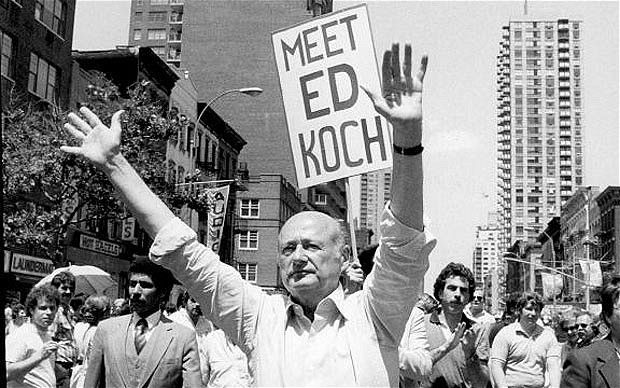
DCI Bush even told then-Congressman Ed Koch (D-NY), threatened anonymously for his work uncovering Operation Condor and its associated evil at the time, "Nothing I can do."
Why does this matter today? What the CIA and Big Money Boys did in Chile in 1973, they're doing to the USA now.
[font size="5"][font color="green"]The author was a Chicago Boy helping turn Chile into a testbed for social experimentation via Austerity. Now they prepare to bring it to the USA. Take Social Security, they beg.[/font color][/font size]
President Clinton and the Chilean Model.
By José Piñera
Midnight at the House of Good and Evil
"It is 12:30 at night, and Bill Clinton asks me and Dottie: 'What do you know about the Chilean social-security system?'” recounted Richard Lamm, the three-term former governor of Colorado. It was March 1995, and Lamm and his wife were staying that weekend in the Lincoln Bedroom of the White House.
I read about this surprising midnight conversation in an article by Jonathan Alter (Newsweek, May 13, 1996), as I was waiting at Dulles International Airport for a flight to Europe. The article also said that early the next morning, before he left to go jogging, President Bill Clinton arranged for a special report about the Chilean reform produced by his staff to be slipped under Lamm's door.
That news piqued my interest, so as soon as I came back to the United States, I went to visit Richard Lamm. I wanted to know the exact circumstances in which the president of the world’s superpower engages a fellow former governor in a Saturday night exchange about the system I had implemented 15 years earlier.
Lamn and I shared a coffee on the terrace of his house in Denver. He not only was the most genial host to this curious Chilean, but he also proved to be deeply motivated by the issues surrounding aging and the future of America. So we had an engaging conversation. At the conclusion, I ventured to ask him for a copy of the report that Clinton had given him. He agreed to give it to me on the condition that I do not make it public while Clinton was president. He also gave me a copy of the handwritten note on White House stationery, dated 3-21-95, which accompanied the report slipped under his door. It read:
Dick,
Sorry I missed you this morning.
It was great to have you and Dottie here.
Here's the stuff on Chile I mentioned.
Best,
Bill.
Three months before that Clinton-Lamm conversation about the Chilean system, I had a long lunch in Santiago with journalist Joe Klein of Newsweek magazine. A few weeks afterwards, he wrote a compelling article entitled,[font color="green"] "If Chile can do it...couldn´t North America privatize its social-security system?" [/font color]He concluded by stating that "the Chilean system is perhaps the first significant social-policy idea to emanate from the Southern Hemisphere." (Newsweek, December 12, 1994).
I have reasons to think that probably this piece got Clinton’s attention and, given his passion for policy issues, he became a quasi expert on Chile’s Social Security reform. Clinton was familiar with Klein, as the journalist covered the 1992 presidential race and went on anonymously to write the bestseller Primary Colors, a thinly-veiled account of Clinton’s campaign.
“The mother of all reforms”
While studying for a Masters and a Ph.D. in economics at Harvard University, I became enamored with America’s unique experiment in liberty and limited government. In 1835 Alexis de Tocqueville wrote the first volume of Democracy in America hoping that many of the salutary aspects of American society might be exported to his native France. I dreamed with exporting them to my native Chile.
So, upon finishing my Ph.D. in 1974 and while fully enjoying my position as a Teaching Fellow at Harvard University and a professor at Boston University, I took on the most difficult decision in my life: to go back to help my country rebuild its destroyed economy and democracy along the lines of the principles and institutions created in America by the Founding Fathers. Soon after I became Secretary of Labor and Social Security, and in 1980 I was able to create a fully funded system of personal retirement accounts. Historian Niall Ferguson has stated that this reform was “the most profound challenge to the welfare state in a generation. Thatcher and Reagan came later. The backlash against welfare started in Chile.”
But while de Tocqueville’s 1835 treatment contained largely effusive praise of American government, the second volume of Democracy in America, published five years later, strikes a more cautionary tone. He warned that “the American Republic will endure, until politicians realize they can bribe the people with their own money.” In fact at some point during the 20th century, the culture of self reliance and individual responsibility that had made America a great and free nation was diluted by the creation of [font color="green"] “an Entitlement State,”[/font color] reminiscent of the increasingly failed European welfare state. What America needed was a return to basics, to the founding tenets of limited government and personal responsibility.
[font color="green"]In a way, the principles America helped export so successfully to Chile through a group of free market economists needed to be reaffirmed through an emblematic reform. I felt that the Chilean solution to the impending Social Security crisis could be applied in the USA.[/font color]
CONTINUED...
http://www.josepinera.org/articles/articles_clinton_chilean_model.htm
So, when you watch wars without end and the rich getting richer while the middle class evaporates, remember: That's how Empire works.
Who died?

https://pivotamerica.com/berta-caceres-woman-murdered-result-hillary-clintons-hard-choices-honduras/
Obviously, you need to work on your elevator speech.
"My elevator pitch is that the United States has a grotesque level of income and wealth inequality where the top one-tenth of 1 percent owns almost as much wealth as the bottom 90 percent, where almost 20 percent of our children are living in poverty, 40 percent of African-American children are living in poverty. We are moving rapidly toward an oligarchic form of society where a small number of families control not only the economy but our political system as well. It is imperative that we develop a strong political movement that says to the billionaire class they cannot have it all." -- Bernie Sanders
Her Husband Works with Him at UBS
They're in the "Weath Management" department.

Before UBS, they all worked together in Washington, where Sen. Phil Gramm (R-Texas) shepherded financial deregulation of the banks through Congress and President Bill Clinton (D-USA) signed it into law, the repeal of New Deal protections that kept Wall Street from using the taxpayers for their tab at the casino. President Bush was there, too, making sure the Banksters got away in 2008.
Forensic economist and former Fed regulator William K. Black wrote it reminds him of what happened during the Savings and Loans Crisis of the late 80s and early 90s. At the time, that was the greatest heist in history.
Maybe you need a little Stiglitz.
Larry Summers: Goldman SackedBy Greg Palast
Reader Supported News, September 16, 2013
Joseph Stiglitz couldn't believe his ears. Here they were in the White House, with President Bill Clinton asking the chiefs of the US Treasury for guidance on the life and death of America's economy, when the Deputy Secretary of the Treasury Larry Summers turns to his boss, Secretary Robert Rubin, and says, "What would Goldman think of that?"
Huh?
Then, at another meeting, Summers said it again: What would Goldman think?
A shocked Stiglitz, then Chairman of the President's Council of Economic Advisors, told me he'd turned to Summers, and asked if Summers thought it appropriate to decide US economic policy based on "what Goldman thought." As opposed to say, the facts, or say, the needs of the American public, you know, all that stuff that we heard in Cabinet meetings on The West Wing.
Summers looked at Stiglitz like Stiglitz was some kind of naive fool who'd read too many civics books.
CONTINUED...
http://www.gregpalast.com/larry-summers-goldman-sacked/
A Nurse in Michigan Helps Explain Why Working People Are Behind Bernie Sanders

A Nurse in Michigan Helps Explain Why Working People Are Behind Bernie Sanders
by Brandon Weber
The Progressive, March 13, 2016
EXCERPT..
“We’ve become a right to work state in recent years, and it’s been a real struggle for some of the unions here,” Weston observed. “When Sanders spoke, he really was speaking to us every day working people. That’s why he won, I think. Some politicians are all about corporations and the wealthy. He’s firmly about us, he’s honest, sincere, and down to earth.”
Weston also commented that working people in Michigan feel both bullied and ignored by Michigan Governor Snyder over the last six year. Snyder, one of the crop of Republican governors elected in 2010, got help in his first campaign for office from some labor unions in Michigan, partly by promising to not push for so-called “right-to-work” legislation. However, when his fellow Republicans in the state began to advocate for it (and other states were moving ahead with it), he helped get it written into law. Snyder was also involved in enacting the “Emergency Manager” legislation giving city bosses the power in financially distressed cities to break contracts, eliminate unions, and renege on pensions for city workers in cities all across Michigan.
But back to Cheryl — as we talked about Bernie Sanders more, she kept using the word, “genuine.”
“Clinton never answered questions at the debate. Bernie did,” she observed. “In fact, by the end of the debate, one of my coworkers who was on the fence and even somewhat in the Hillary camp when we got there said, ‘I’m voting for Bernie.’”
“Twenty years ago when my grandfather was still alive, he predicted an uprising by the people — the everyday working people — of this country. I think we’re seeing it now,” she concluded.
CONTINUED...
http://www.progressive.org/authors/brandon-weber
Ben Bagdikian, Visionary
We have lost a giant, the man who coined the phrase "The Media Monopoly," Ben Bagdikian.

Ben Bagdikian, Visionary
Jeff Cohen
Fairness and Accuracy In Media FAIR, March 12, 2016
EXCERPT...
Before almost anyone else, Ben warned about the impact of the modern wave of media mergers that accelerated during the Reagan years (and accelerated further during the Clinton administration). In the first years of FAIR, I heard from various sympathetic journalists in mainstream media who said they were thrilled that, finally, a pro–working journalist media watch group had formed . . . but that we were off-base to emphasize the impact of corporate owners—that the problem was in the newsroom far more than the boardroom. A few years and a few mergers later, these same journalists told us that we’d been right, almost prophetic—that boardrooms were undermining journalism, often quite nakedly.
But we weren’t the visionaries. It was Ben Bagdikian who was the seer.
Ben was a journalist’s journalist—from his years as a local reporter to his years at the Washington Post (where he played a crucial role in publishing the Pentagon Papers and went undercover as an inmate in a maximum-security prison). He served the public, not the boardroom—and luckily for him, he got out of corporate media before the conglomerate era.
SNIP...
Ben’s motto through all these decades could have been: “Tell the Truth and Stand Strong.”
The New York Times obit for Ben (3/11/16) quotes his message to his journalism students at UC Berkeley:
[font color="green"]Never forget that your obligation is to the people. It is not, at heart, to those who pay you, or to your editor, or to your sources, or to your friends, or to the advancement of your career. It is to the public.[/font color]
SOURCE: http://fair.org/home/ben-bagdikian-visionary/
Additional info on corporate owned news: http://www.corporations.org/media/
Never Forget.
-- http://www.theatlantic.com/politics/archive/2015/10/bernie-sanders-mayor/407413/
The person who created that, those who spread that to build hatred, and those who agree with its message are the worst people on earth.
Profile Information
Gender: MaleMember since: 2003 before July 6th
Number of posts: 55,745
